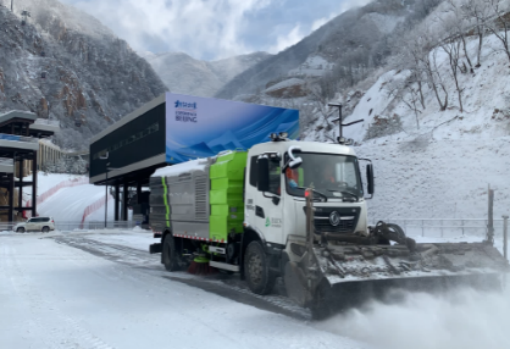Consistently regarding suppliers as important business partners, Beijing Enterprises Urban Resources attaches great importance to establishing a good, win-win, and close business relationship with them in a bid to integrate resources of both sides to enhance service quality. the Group formulated the Supplier Management System(《供貨商管理制度》), the Inventory Material Management Measure (《庫存物資管理辦法》, the Collected Material Acceptance Standards (《集採物資驗收標準》) , the Supply Chain Management System (《供應鏈管理制度》),and Supplier Management Policy (《供應商管理政策》), comprehensively promoting the standardization, digitization, and greening of supply chain management.
The Group strengthens and standardizes the management of suppliers, categorizing suppliers into three main types: qualified suppliers, reserve suppliers, and blacklisted suppliers. Qualified suppliers are further divided into strategic suppliers, Class A suppliers, Class B suppliers, and trial suppliers based on various considerations such as enterprise qualifications and performance, after-sales service capabilities, on-site inspections, quality management, progress management, receipt inspection, labour use, environmental protection, and safety risks. The Supplier Management Policy of the Group requires all suppliers to adhere to labour standards, human rights protection, health and work safety, environmental protection, and business ethics.
The Group abides by the requirements of relevant internal regulatory document such as the Supplier Management Policy to deepen the control of environmental and social risks at various stages of the supply chain. During the shortlisting and selection stage, the Group fully implements the online registration and approval system of the recruitment system, and formulates shortlisting standards based on the different suppliers, requiring all suppliers to optimize the use of natural resources, avoid the use of prohibited substances, and properly manage waste. Suppliers with significant quality issues, administrative penalties or dishonest records, or major safety production accidents and other environmental and social risks will not be included in the qualified supplier database. Furthermore, the Group vigorously promotes the development of a green supply chain, giving priority to excellent suppliers with good ESG performance. Suppliers with green credentials, such as ISO9001 quality management system certification, ISO14001 environmental management system certification, OHSAS18000 occupational health and safety management system certification, and SA8000 social responsibility certification will receive audit bonus points and preferred recommendations.
During the supplier cooperation phase, the Group conducts annual supplier evaluations as a routine, assessing project companies’ suppliers of equipment, materials, engineering construction, technical consulting and other business, to ensure compliance with the Supplier Management Policy . In 2023, 272 suppliers participated in the evaluation. Furthermore, the Group employs a combination of online and offline methods to comprehensively assess suppliers. Multi-dimensional supplier data are collected through the procurement system’s supplier management module, and supplier on-site assessments are conducted by the Supply Chain Management Center in coordination with other functional departments and regional/project companies. The Group carries out class based management for suppliers with differentiated policies applied based on evaluation results, aiming to comprehensively reduce cooperation risks and environmental and social risks in the supply chain and achieve strategic cooperation and mutual development with high-quality suppliers.
The Group encourages suppliers to obtain ESG-related certifications and participate in ESG training. We offer suggestions for improving ESG management and provide support to suppliers through information sharing, two-way communication, high-level discussions, supplier incentives, and assistance. We also conduct ESG-related training for employees in the procurement department to enhance the capabilities of both parties in terms of technology, cost, service, response efficiency, and ESG performance, thereby co-creating value with our suppliers.
the first phase of the Group’s supply chain digitalization was completed and put online. Using efficient information management tools to transfer offline operation to online, including bidding inquiry and comparison, supplier price entry, contract signing, procurement plan management, order generation, logistics tracking, and purchase warehousing, picking and delivery, supplier reconciliation and evaluation and other business sectors. Moving offline business to online can save a significant amount of resources in generating and transmitting paper documents each year. During the implementation of digital supply chain construction, we managed the group’s commonly used materials and equipment in a refined category, unified standards, specifications, and names, standardized the procurement process of hundreds of project companies in the Group, and transformed information technology into a link between the headquarters’ management center and the field. The network nerves of the front-line execution of the member companies keep the entire group in sync, form a joint force, and improve procurement supply chain execution.
In 2021, the Group carried out the snow and ice removal business for the Winter Olympics to facilitate the smooth Winter Olympics. For the snow melting agent necessary for snow removal business, we strictly implemented relevant requirements of national standards, and widely purchased and used the environmentally-friendly and pollution-free “non-chlorine organic snow melting agent”, which had no damage to the roads and the surrounding soil, and were beneficial to the growth of green trees in the competition area in the coming year, thereby making contribution to building green Winter Olympics

In order to improve the quality of lubricating oil and tire procurement, the Group intensified the assessment on the green qualification of suppliers to realize unified tire supply from industry-leading partners and implement centralized procurement of tires for the whole Group, which solved the problems of the increased usage, shortened vehicle service life and increased environmental pollution caused by the inconsistent quality review standards in the independent procurement of project companies.
